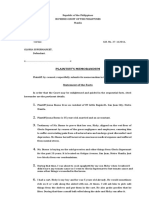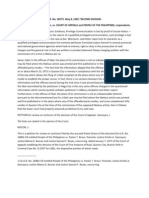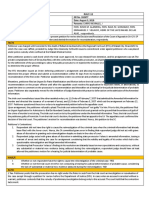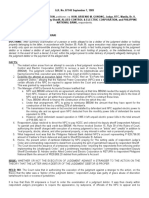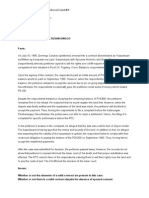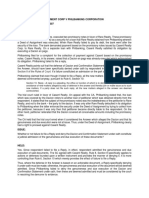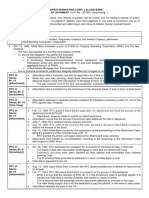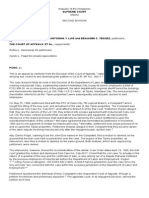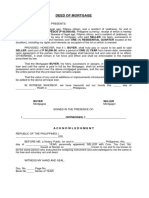0 ratings0% found this document useful (0 votes)
98 views24 Ramos V Condez
24 Ramos V Condez
Uploaded by
Julius ManaloThe Supreme Court reversed the lower court's dismissal of the case. While the plaintiffs' cause of action accrued in 1952 when the land sale contract was executed, the 10-year prescriptive period was interrupted in 1956 when the defendants acknowledged the validity of the contract and promised to deliver the land. As such, the plaintiffs' filing of the case in 1963 was still within the 10-year period and was not prescribed. The case was remanded to the lower court.
Copyright:
© All Rights Reserved
Available Formats
Download as DOCX, PDF, TXT or read online from Scribd
24 Ramos V Condez
24 Ramos V Condez
Uploaded by
Julius Manalo0 ratings0% found this document useful (0 votes)
98 views1 pageThe Supreme Court reversed the lower court's dismissal of the case. While the plaintiffs' cause of action accrued in 1952 when the land sale contract was executed, the 10-year prescriptive period was interrupted in 1956 when the defendants acknowledged the validity of the contract and promised to deliver the land. As such, the plaintiffs' filing of the case in 1963 was still within the 10-year period and was not prescribed. The case was remanded to the lower court.
Original Description:
1
Original Title
24 Ramos v Condez
Copyright
© © All Rights Reserved
Available Formats
DOCX, PDF, TXT or read online from Scribd
Share this document
Did you find this document useful?
Is this content inappropriate?
The Supreme Court reversed the lower court's dismissal of the case. While the plaintiffs' cause of action accrued in 1952 when the land sale contract was executed, the 10-year prescriptive period was interrupted in 1956 when the defendants acknowledged the validity of the contract and promised to deliver the land. As such, the plaintiffs' filing of the case in 1963 was still within the 10-year period and was not prescribed. The case was remanded to the lower court.
Copyright:
© All Rights Reserved
Available Formats
Download as DOCX, PDF, TXT or read online from Scribd
Download as docx, pdf, or txt
0 ratings0% found this document useful (0 votes)
98 views1 page24 Ramos V Condez
24 Ramos V Condez
Uploaded by
Julius ManaloThe Supreme Court reversed the lower court's dismissal of the case. While the plaintiffs' cause of action accrued in 1952 when the land sale contract was executed, the 10-year prescriptive period was interrupted in 1956 when the defendants acknowledged the validity of the contract and promised to deliver the land. As such, the plaintiffs' filing of the case in 1963 was still within the 10-year period and was not prescribed. The case was remanded to the lower court.
Copyright:
© All Rights Reserved
Available Formats
Download as DOCX, PDF, TXT or read online from Scribd
Download as docx, pdf, or txt
You are on page 1of 1
#24 RAMOS v CONDEZ
GR NO. L-22072 ISSUE
AUGUST 30, 1967 WON the plaintiff is barred from filing an action on the ground that the action
By: GUZMAN already prescribed.
Topic: PRESCRIPTION
Plaintiffs: ALFONSO BUN RAMOS, ET AL HELD/RATIO
Defendants: EMILIANO CONDEZ, ET AL NO. THE SC SET ASIDE AND REVOKED THE DECISION OF THE LOWER
Ponente: ANGELES, J. COURT AND REMANDED TO SUCH.
The cause of action in the case at bar is for a judicial declaration of plaintiffs'
RECIT-READY: right to the land and recovery of the possession thereof, or for damages.
Plaintiffs' cause of action accrued on June 25, 1952, when the deed of
absolute sale was executed.
DOCTRINE: The action being based on a written contract, it must be brought within ten
The action being based on a written contract, it must be brought within ten years from years from the time the cause of action accrues (Article 1144, New Civil
the time the cause of action accrues (Article 1144, New Civil Code). The running of the Code).
period of limitation of action was, however, interrupted on November 10, 1956, when The running of the period of limitation of action was, however, interrupted on
the defendants wrote the plaintiffs acknowledging the validity of the deed of sale and November 10, 1956, when the defendants wrote the plaintiffs acknowledging
promising to comply with their commitment as embodied therein that they would deliver the validity of the deed of sale and promising to comply with their commitment
the land which they had sold to the plaintiffs. Hence, when the present action was filed as embodied therein that they would deliver the land which they had sold to
on May 22, 1963, the cause of action had not yet prescribed. the plaintiffs. Hence, when the present action was filed on May 22, 1963, the
cause of action had not yet prescribed.
FACTS
The case is an appeal from an order dismissing the case for the reason that
the cause of action has prescribed.
On May 22, 1963, Plaintiffs, filed an action in the CFI against the Defendants.
On June 1952, Defendants sold to the plaintiffs a parcel of land.
In the early part of 1956, the plaintiffs’ decided to cultivate the parcel of land
sold by the defendant.
However, it was discovered that the land sold by the defendants, belonged to
another person other than the defendants.
Consequently, plaintiffs were not able to occupy and cultivate the said land.
Now the plaintiff prayed and ordered the defendants to jointly and severally
deliver to the plaintiffs the two hectares of land.
The defendants filed a motion to dismiss on two grounds:
o That the action has prescribed: Defendants argue that as the deed
of sale was executed on June 25, 1952, and the action was filed on
May 22, 1963, more than ten years had elapsed, thus the action
had prescribed.
o The complaint states no cause of action.
Plaintiffs contended and admitted that the cause of action had accrued on
Jun 25, 1952, however, in view of the defendants’ written acknowledgement
of the validity of the deed of absolute sale and promise to deliver the land
which they sold to plaintiffs, as expressed in defendants’ letter of November
10, 1956, the running of the prescriptive period for the commencement of the
action was tolled on that date.
o As an action was based upon written contracts prescribes in ten
years, hence, the instant action which was filed on May 12, 1963,
was commenced within the period of statute of limitation.
LOWER COURT: dismissed the case, the action was already prescribed
based on the ground of fraud.
You might also like
- People Vs CamposDocument1 pagePeople Vs Camposracrabe0% (1)
- 33 Case Concerning Avena and Other Mexican NationalsDocument2 pages33 Case Concerning Avena and Other Mexican NationalsJulius ManaloNo ratings yet
- Oca v. Tormis FactsDocument2 pagesOca v. Tormis FactsHazel100% (1)
- Ramirez and de Marcaida vs. Redfern PDFDocument5 pagesRamirez and de Marcaida vs. Redfern PDFral cbNo ratings yet
- Metrobank vs. Rural Bank of GeronaDocument1 pageMetrobank vs. Rural Bank of GeronaMaggie VillasencioNo ratings yet
- in Re Petition TorresDocument3 pagesin Re Petition TorresJayNo ratings yet
- MASIKIP v. PASIG DigestDocument2 pagesMASIKIP v. PASIG DigestClaire MarceloNo ratings yet
- Balatbat Vs AriasDocument5 pagesBalatbat Vs AriasAlandia GaspiNo ratings yet
- Case Digest: Dreamland Hotel & Prentice v. JohnsonDocument3 pagesCase Digest: Dreamland Hotel & Prentice v. JohnsonJepz FlojoNo ratings yet
- 17 La Mallorca v. CaDocument6 pages17 La Mallorca v. CaRaynin MendozaNo ratings yet
- Caniza Case and Republic V CADocument3 pagesCaniza Case and Republic V CAEmiaj Francinne MendozaNo ratings yet
- City of Manila V CADocument18 pagesCity of Manila V CApjNo ratings yet
- 34 Emilio V Rapal (SUNGCAD)Document2 pages34 Emilio V Rapal (SUNGCAD)Telle MarieNo ratings yet
- 1999 Ms Ma Cecilia Salazar Santos20210519 13 18j6p1gDocument2 pages1999 Ms Ma Cecilia Salazar Santos20210519 13 18j6p1gJadel Kaye ALJ TrainingNo ratings yet
- CASE DIGEST: Silverio v. Ricardo, April 17, 2013Document8 pagesCASE DIGEST: Silverio v. Ricardo, April 17, 2013Manuel Rodriguez IINo ratings yet
- Government v. El HogarDocument10 pagesGovernment v. El Hogarvictoria4391tiangco100% (1)
- Guidote vs. Borja - 53 Phil 900 - G.R. No. L-28920 - October 24, 1928Document4 pagesGuidote vs. Borja - 53 Phil 900 - G.R. No. L-28920 - October 24, 1928Ma AleNo ratings yet
- Linan Vs PunoDocument2 pagesLinan Vs PunoMichael C. PayumoNo ratings yet
- Agency Case Digests (#2, 12-20) 2. Orient Air v. Court of Appeals 197 SCRA 645 FactsDocument13 pagesAgency Case Digests (#2, 12-20) 2. Orient Air v. Court of Appeals 197 SCRA 645 FactsCleinJonTiuNo ratings yet
- Trial Memorandum BuenoDocument3 pagesTrial Memorandum BuenoEfie LumanlanNo ratings yet
- Bravo Vs CaDocument10 pagesBravo Vs CaAngela Kristine PinedaNo ratings yet
- Dy Buncio V Ong Guan CanDocument1 pageDy Buncio V Ong Guan CangabbyborNo ratings yet
- CIV2Document2 pagesCIV2Rina LibaNo ratings yet
- Obligations and Contracts Dioquino Vs Laureano 33 SCRA 65 February 7, 2020 CASE DIGESTDocument10 pagesObligations and Contracts Dioquino Vs Laureano 33 SCRA 65 February 7, 2020 CASE DIGESTBrenda de la GenteNo ratings yet
- P V BadosoDocument3 pagesP V BadosoEduard Doron FloresNo ratings yet
- Conflict of Laws Appilicable Laws Laws Governing Contracts (1992)Document11 pagesConflict of Laws Appilicable Laws Laws Governing Contracts (1992)Cecille Therese PedregosaNo ratings yet
- Javier V GonzalesDocument2 pagesJavier V GonzalesMa. Hazel Joy FacoNo ratings yet
- Rule 112Document3 pagesRule 112quasideliksNo ratings yet
- Gutierrez vs. Gutierrez 56 Phil. 177Document3 pagesGutierrez vs. Gutierrez 56 Phil. 177LhowellaAquino100% (1)
- Art. 1891) of The Civil Code Impose Upon An Agent The Obligation To Deliver To His Principal All Funds Collected On His AccountDocument1 pageArt. 1891) of The Civil Code Impose Upon An Agent The Obligation To Deliver To His Principal All Funds Collected On His Accountk santosNo ratings yet
- NPC v. GONONGDocument2 pagesNPC v. GONONGJustineNo ratings yet
- Sps. Roberto Aboitiz & Maria Cristina Cabarrus v. Peter and Victoria PoDocument5 pagesSps. Roberto Aboitiz & Maria Cristina Cabarrus v. Peter and Victoria PoPAULYN MARIE BATHANNo ratings yet
- Carabeo Vs Spouses DingcoDocument2 pagesCarabeo Vs Spouses DingcoFrankneil AdduculNo ratings yet
- Cases CorpoDocument174 pagesCases CorpoChelsea GarciaNo ratings yet
- Grave AbuseDocument4 pagesGrave AbuseKCNo ratings yet
- Association of Small Landowners of The Philippines v. Secretary of DARDocument3 pagesAssociation of Small Landowners of The Philippines v. Secretary of DARRush YuviencoNo ratings yet
- Cortes V YutiboDocument14 pagesCortes V YutiboCharlene Salazar AcostaNo ratings yet
- Request For Temporary Shop ClosureDocument1 pageRequest For Temporary Shop ClosureApril Lourdes Punzalan AragonNo ratings yet
- Juerez v. Court of Appeals, G.R. No. 93474, October 7, 1992Document1 pageJuerez v. Court of Appeals, G.R. No. 93474, October 7, 1992Eli SNo ratings yet
- Civil Law - Garcia v. Garcia, G.R. No. 169157, November 14, 2011Document2 pagesCivil Law - Garcia v. Garcia, G.R. No. 169157, November 14, 2011Dayday AbleNo ratings yet
- Reply (Specific Denials Sec 10 Rule 8) Casent Realty V PhilbankingDocument2 pagesReply (Specific Denials Sec 10 Rule 8) Casent Realty V PhilbankingAlexis Anne P. ArejolaNo ratings yet
- Legal EthicsDocument5 pagesLegal EthicsArjane Aram SamaniegoNo ratings yet
- 10 Oropeza V Allied BankDocument4 pages10 Oropeza V Allied BankmeriiNo ratings yet
- Case 3 - ManliguezDocument4 pagesCase 3 - ManliguezCharmaigne LaoNo ratings yet
- Laidziii: Case Digest in Oblicon - ADocument2 pagesLaidziii: Case Digest in Oblicon - ANaoimi LeañoNo ratings yet
- Gonzales Vs Kalaw KatigbakDocument4 pagesGonzales Vs Kalaw KatigbakMark Joseph M. VirgilioNo ratings yet
- Trans-Pacific Industrial v. CADocument1 pageTrans-Pacific Industrial v. CAKimNo ratings yet
- Robinson & Co. v. Belt, 187 U.S. 41 (1902)Document8 pagesRobinson & Co. v. Belt, 187 U.S. 41 (1902)Scribd Government DocsNo ratings yet
- 43 Rustan Pulp & Paper Mills V IACDocument10 pages43 Rustan Pulp & Paper Mills V IACyousirneighmNo ratings yet
- 45 Digest West Coast V HurdDocument1 page45 Digest West Coast V HurdSharon G. BalingitNo ratings yet
- 14 Price and Sulu Development Co. vs. Martin 58 Phil. 707Document7 pages14 Price and Sulu Development Co. vs. Martin 58 Phil. 707gabbieseguiranNo ratings yet
- 02 Comelec V EspaolDocument2 pages02 Comelec V EspaolYPENo ratings yet
- People V AmparadoDocument1 pagePeople V Amparadocmv mendozaNo ratings yet
- PNOC v. Keppel PhilippinesDocument16 pagesPNOC v. Keppel Philippinesjagabriel616No ratings yet
- Tuna Processing, Inc. vs. Philippine Kingford, Inc., 667 SCRA 287 (2012)Document5 pagesTuna Processing, Inc. vs. Philippine Kingford, Inc., 667 SCRA 287 (2012)DNAANo ratings yet
- Law 107 - Tan Cong V StewartDocument2 pagesLaw 107 - Tan Cong V StewartDanielle AbuelNo ratings yet
- Rem Rev Case DigestDocument11 pagesRem Rev Case DigestVictor VarelaNo ratings yet
- Pascual vs. Cir 166 Scra 560Document5 pagesPascual vs. Cir 166 Scra 560FranzMordenoNo ratings yet
- Cavite Development Bank Vs SpsDocument2 pagesCavite Development Bank Vs SpsJug HeadNo ratings yet
- Deed of Mortgage 2019Document1 pageDeed of Mortgage 2019Richard PamplenaNo ratings yet
- Oblicon Week 13Document3 pagesOblicon Week 13Julius ManaloNo ratings yet
- 16 RAS V SUADocument2 pages16 RAS V SUAJulius Manalo100% (1)
- Aznar V SucillaDocument1 pageAznar V SucillaJulius ManaloNo ratings yet
- Human Rights MidtermsDocument12 pagesHuman Rights MidtermsJulius ManaloNo ratings yet
- Civpro DigestsDocument31 pagesCivpro DigestsJulius ManaloNo ratings yet
- Oblicon Week 13Document3 pagesOblicon Week 13Julius ManaloNo ratings yet
- 133 Sales v. SandiganbayanDocument20 pages133 Sales v. SandiganbayanJulius ManaloNo ratings yet
- Oblicon Week 14 PDFDocument10 pagesOblicon Week 14 PDFJulius ManaloNo ratings yet
- 5 People v. Gallo y GadotDocument13 pages5 People v. Gallo y GadotJulius ManaloNo ratings yet
- 2019legislation - Revised Corporation Code Comparative Matrix PDFDocument120 pages2019legislation - Revised Corporation Code Comparative Matrix PDFlancekim21No ratings yet
- Agency Case Doctrines GuzrevDocument13 pagesAgency Case Doctrines GuzrevJulius ManaloNo ratings yet
- The Power of The President To Revoke Unilaterally in A TreatyDocument1 pageThe Power of The President To Revoke Unilaterally in A TreatyJulius ManaloNo ratings yet
- Art. 538 - 558Document23 pagesArt. 538 - 558Julius ManaloNo ratings yet
- 180 Valisno V AdrianoDocument2 pages180 Valisno V AdrianoJulius Manalo100% (1)
- Keeler Electric V RodriguezDocument1 pageKeeler Electric V RodriguezJulius ManaloNo ratings yet
- 125640-1997-Liwanag v. Court of AppealsDocument5 pages125640-1997-Liwanag v. Court of AppealsJulius ManaloNo ratings yet
- 112 PCIB v. Alejandro (2007)Document11 pages112 PCIB v. Alejandro (2007)Julius ManaloNo ratings yet
- 128450-1993-Philippine National Bank v. Court of AppealsDocument9 pages128450-1993-Philippine National Bank v. Court of AppealsJulius ManaloNo ratings yet
- 2.15 Evaluator Aide-Memoire TemplateDocument2 pages2.15 Evaluator Aide-Memoire TemplateJulius ManaloNo ratings yet
- Aide Memoire - Pil - Jules GuzmanDocument9 pagesAide Memoire - Pil - Jules GuzmanJulius ManaloNo ratings yet
- Prudential Bank V CADocument2 pagesPrudential Bank V CAJulius Manalo100% (1)
- 55 SUICO V PNBDocument2 pages55 SUICO V PNBJulius ManaloNo ratings yet
- Up Civil Law Reviewer 2017Document617 pagesUp Civil Law Reviewer 2017Julius Manalo83% (6)
- Civpro Answers (Midterm)Document5 pagesCivpro Answers (Midterm)Angel BangasanNo ratings yet
- Interpretation of UN ResolutionsDocument35 pagesInterpretation of UN ResolutionsLeigh VillegasNo ratings yet
- DPWH Vs COADocument5 pagesDPWH Vs COAKris Mee TrujilloNo ratings yet
- LAW and Morality Synopsis 140101157Document6 pagesLAW and Morality Synopsis 140101157vaibhav vermaNo ratings yet
- In The Matter Of... Garcia V GarciaDocument9 pagesIn The Matter Of... Garcia V Garciagilbert miganoNo ratings yet
- In The United States District Court For The Southern District of New YorkDocument3 pagesIn The United States District Court For The Southern District of New YorkThomas WareNo ratings yet
- Duties of Counsel NotesDocument7 pagesDuties of Counsel Notesabdul rahimNo ratings yet
- G.R. No. 193261 - Sabili v. Commission On ElectionsDocument10 pagesG.R. No. 193261 - Sabili v. Commission On ElectionsKheem GinesNo ratings yet
- Nabus Vs PacsonDocument2 pagesNabus Vs PacsonphgmbNo ratings yet
- Bail Application FormatDocument2 pagesBail Application Formathemant raj100% (1)
- SYLLABUS in Rem Rev - 2020-21Document86 pagesSYLLABUS in Rem Rev - 2020-21Jevi RuiizNo ratings yet
- DNA@NewspaperWala 17 PDFDocument12 pagesDNA@NewspaperWala 17 PDFshamirNo ratings yet
- Facts of The CaseDocument3 pagesFacts of The Caseanushka kashyapNo ratings yet
- Skadden Letter March 31Document4 pagesSkadden Letter March 31ForkLogNo ratings yet
- ZerodhaDocument24 pagesZerodhaMR. TachyonNo ratings yet
- MemorandumDocument9 pagesMemorandumRobert BalaoNo ratings yet
- Case Studies Hand Out StudentDocument4 pagesCase Studies Hand Out StudentVikas KanwarNo ratings yet
- Opinion SC2024-0072Document14 pagesOpinion SC2024-0072lordescastleNo ratings yet
- PNB v. CADocument5 pagesPNB v. CAKathrynAkmadNo ratings yet
- Nina Xiaoyan Li v. Merck & CoDocument2 pagesNina Xiaoyan Li v. Merck & Cotaoguang.huangNo ratings yet
- Lawsuit Against Birdman, Young Thug, Cash Money Records and Young Money RecordsDocument25 pagesLawsuit Against Birdman, Young Thug, Cash Money Records and Young Money RecordsBen BraschNo ratings yet
- 1992-Prudential Bank v. Intermediate AppellateDocument16 pages1992-Prudential Bank v. Intermediate AppellateKathleen MartinNo ratings yet
- In The High Court of Judicature at Bombay Civil Appellate Jurisdiction Writ Petition No.584 of 2022Document2 pagesIn The High Court of Judicature at Bombay Civil Appellate Jurisdiction Writ Petition No.584 of 2022vijay killedarNo ratings yet
- Saludo v. PNBDocument2 pagesSaludo v. PNBErikha Araneta67% (3)
- CPC - Module 4 - (E) - Written StatementDocument22 pagesCPC - Module 4 - (E) - Written StatementVishnupriya V 19BLB1033No ratings yet
- General Banking Law of 2002Document31 pagesGeneral Banking Law of 2002Jon Raymer OclaritNo ratings yet
- Perez, Nuguid v. NuguidDocument6 pagesPerez, Nuguid v. NuguidPepper PottsNo ratings yet
- Pharma v. DuqueIII Case DigestDocument3 pagesPharma v. DuqueIII Case DigestALEXANDRIA RYLE MUNARNo ratings yet
- Affidavit of Consolidation of OwnershipDocument2 pagesAffidavit of Consolidation of OwnershipLukeNo ratings yet



















